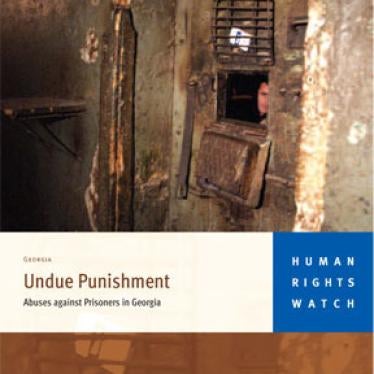Thousands of prisoners in Georgia live in inhuman and degrading conditions and many are subjected to severe beatings and other ill-treatment, Human Rights Watch said in a report released today.
The 101-page report, “Undue Punishment: Abuses against Prisoners in Georgia,” documents the conditions in which the majority of the country’s 13,000 prisoners are being held. In many facilities, prisoners live in severely overcrowded, filthy and poorly-ventilated cells. In the last two years, the prison population has nearly doubled due to the routine use of pretrial detention, even for nonviolent offences. Nearly two-thirds of the country’s prisoners are still awaiting trial. In many facilities, conditions of detention constitute degrading treatment in violation of Georgia’s own laws and its international human rights obligations.
“The Georgian government portrays itself as fully committed to human rights and has repeatedly promised to address the ghastly conditions in its prison system,” said Holly Cartner, Europe and Central Asia director at Human Rights Watch. “But instead of fulfilling these promises, the authorities have taken deliberate steps to restrict fundamental rights, including the rights of those in detention.”
Since December, the government has stepped up its effort to crack down on organized crime, including the power of organized crime bosses (locally known as “thieves in law”) in the prison system. In the wake of these policy changes, many prisoners have been subjected to beatings and other degrading treatment, such as repeated and unnecessary strip searches. At times, the ill-treatment of prisoners has risen to the level of torture.
In some prisons, law enforcement operations undertaken to suppress disturbances, which the government characterized as riots, have resulted in serious injury and even death for some detainees. The most serious of these incidents occurred on March 27 in Tbilisi Prison No. 5, resulting in the death of at least seven detainees and serious injury to dozens of others. The government did not open an investigation into the actions of law enforcement agents until three months after the incident, following pressure to do so.
“Although the authorities must maintain control of the prisons, their means have not always been justified,” Cartner said. “The government has failed to conduct effective investigations into the ill-treatment and deaths of detainees at the hands of law enforcement agents. This contributes to a climate of impunity for abuses allegedly perpetrated by law enforcement.”
Prisoners, even those held in the newly renovated prisons, receive inadequate food and substandard, if any, medical care. Many prisoners also lack access to exercise and often cannot leave their cells for weeks or months at a time. Prisoners in certain facilities have faced restrictions on their right to confidential meetings with their lawyers or were denied meetings altogether.
The Georgian government has failed to provide conditions necessary for rehabilitation of prisoners, as required by international standards. Most prisoners have no possibility to work, study or engage in any meaningful activity. Juvenile prisoners awaiting trial receive no education, although they may be held in pretrial detention for more than a year. Recent amendments to the Law on Imprisonment reduced the number of family visits for many categories of prisoners. Prisoners told Human Rights Watch that they were not being allowed even the family visits guaranteed by law.
“The European Union and other donors are providing the Georgian government with substantial financing to build new prisons,” Cartner said. “But simply giving money and building new prisons isn’t going to end abuses against prisoners. The government must change its approach to the treatment of prisoners and resolve fundamental problems in the prison system.”
Human Rights Watch called on the Georgian government to take immediate steps to protect the rights of prisoners by allowing for the establishment of an independent commission of inquiry into the events of March 27 in the Republican Prison Hospital and Tbilisi Prison No. 5. In general, the authorities should investigate all allegations of abuse, and announce at the highest levels of government a policy of zero tolerance for abuses perpetrated by law enforcement agents.
To the greatest extent possible, the government should utilize alternatives to pretrial detention to reduce the number of defendants remanded to pretrial detention. The authorities must also guarantee detainees’ rights to confidential meetings with their lawyers, to regular meetings with their family members, and to exercise at least one hour a day, without exception.







